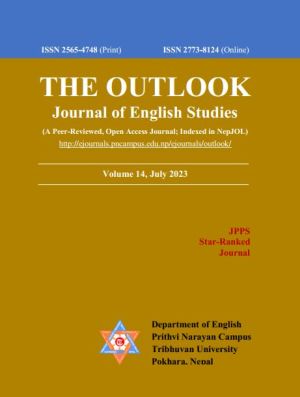The Echoes of Subaltern’s Misery in Khaled Hosseini’s The Kite Runner
DOI:
https://doi.org/10.3126/ojes.v14i1.56662Keywords:
Subaltern, dehumanization, discrimination, marginalization, the HazarasAbstract
In his magnum opus, The Kite Runner, Khaled Hosseini mirrors the misery and dehumanization of indefensible Hazaras, an ethnic group of Afghanistan. The novel illustrates the pathetic conditions of the Hazaras as a subaltern minority in the background of the political turmoil in Afghanistan. As marginalized people, they endure both physical and psychological oppression imposed by the Pashtuns, who believe themselves as superior and consider the Hazaras as others. Though the Hazaras are suppressed with physical violence, verbal abuse, slavery, genocide, etc., they are found indefensible in behaviour. Their silence to social domination points to how the mainstream history has gauged the voice of lower strata working class peasants in Afghanistan. The paper aims to explore the misery of Hazaras as a subaltern group, illuminating their endurance in response to injustice imposed on them. It primarily focuses upon the silence of Ali and Hassan to injustice and discrimination which signifies them as subaltern characters. The paper employs subaltern approaches as suggested by Antonio Gramsci, Ranajit Guha and Gayatri Chakravorty Spivak. The paper ultimately agrees with the view of Spivak that subalterns cannot speak for their rights and justice.
Downloads
Downloads
Published
How to Cite
Issue
Section
License

This work is licensed under a Creative Commons Attribution-NonCommercial 4.0 International License.
This license enables reusers to distribute, remix, adapt, and build upon the material in any medium or format for noncommercial purposes only, and only so long as attribution is given to the creator.

